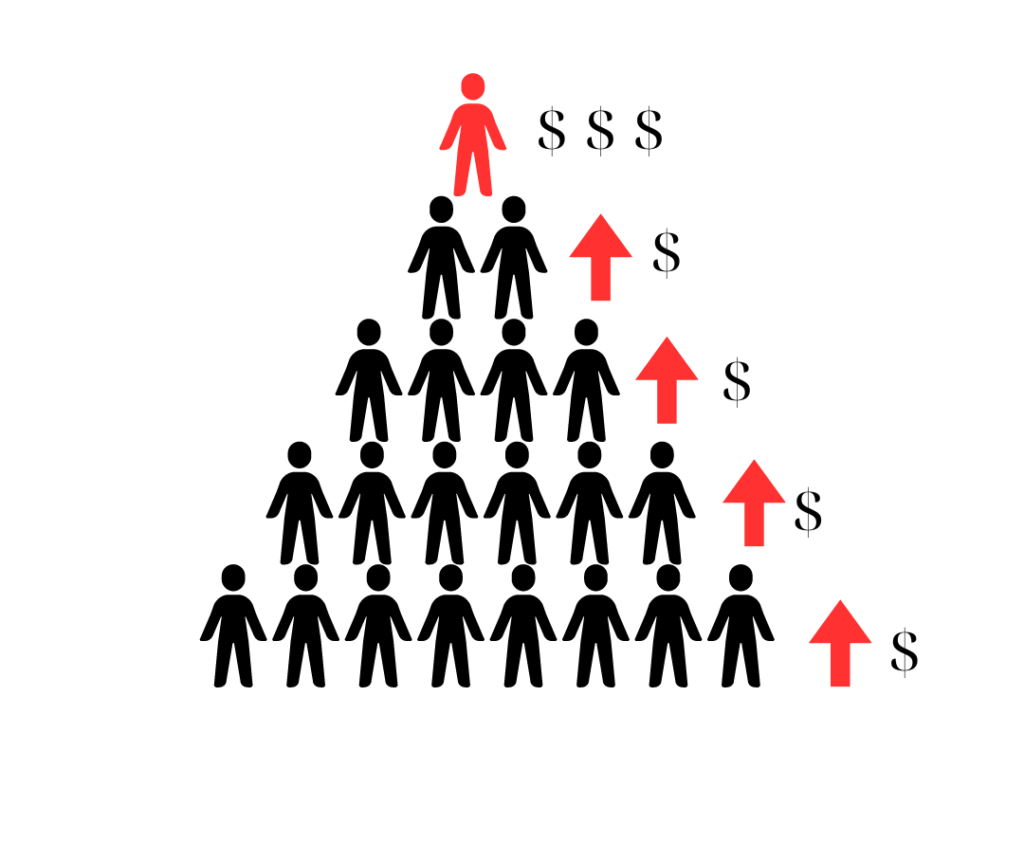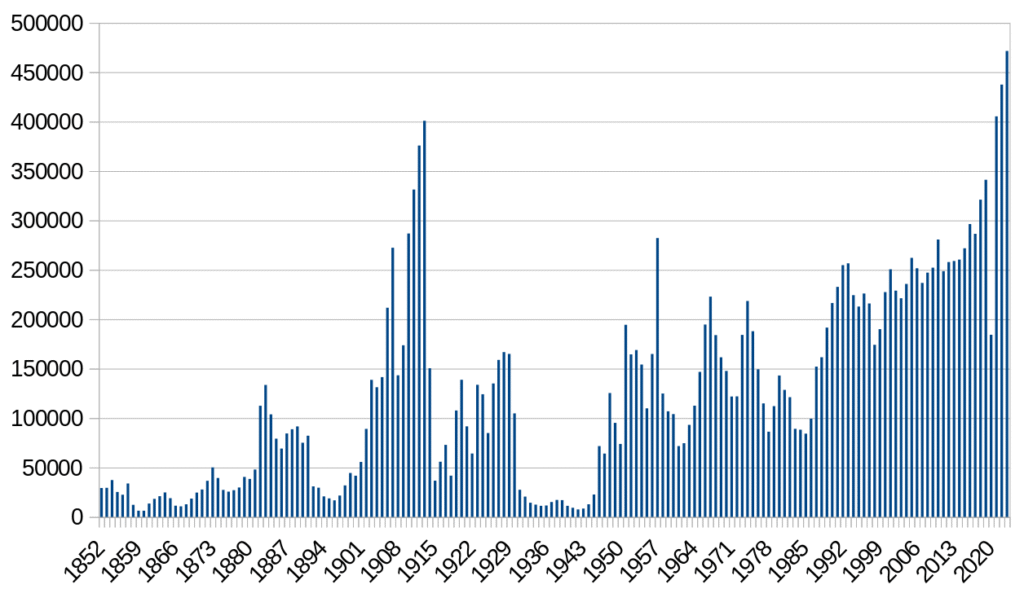Editor’s note: This article was originally published on Population Institute Canada’s website (populationinstitutecanada.ca) on April 30th, 2024. It is republished on Dominion Review with permission of the author.
“There’s no place for the state in the bedrooms of the nation,” Pierre Elliott Trudeau famously said in 1967 while discussing his omnibus bill with reporters, which included changes to the criminal code regarding homosexuality.
But, in the government of Pierre’s son Justin, the state is edging its way back into the bedrooms of the nation. Not in the ways that Pierre was talking about, of course. There is possibly no more avid supporter of sexual diversity than Justin Trudeau, who had the Pride flag displace the Canadian flag in front of the Office of the Prime Minister and Privy Council during Pride month in 2023 and attended a Pride flag-raising ceremony on Parliament Hill. In fact, Trudeau Jr. never looks happier than when participating in a Pride parade or posing with drag queens.
Canada’s population growth rate brings it Third World problems
Under Justin Trudeau’s government, the state is facing well-deserved backlash over the housing crisis it created through its irresponsible immigration policy. When permanent and non-permanent residents, students, refugees and asylum seekers are included, Trudeau’s influx exceeded one million in both 2022 and 2023. Merely 9 months after Canada reached the milestone of 40 million in June 2023, it added yet another million, reaching 41 million in March 2024. At 3.2% annually, Canada’s growth rate exceeds not only that of every other OECD country, but of most countries in the world, including those in sub-Saharan Africa. In fact, in a special report, the National Bank of Canada warned that Canada is now in a “population trap,” where population growth exceeds economic growth, which has long impeded development in the world’s poorest countries. The Bank of Nova Scotia has linked Canada’s rapid population growth to its recent decline in productivity.
As a result of its self-inflicted crisis, the government is now pressuring provinces and municipalities to increase housing stock by any means necessary. In 2021, the federal government imposed the “Underused Housing Tax,” under which owners of vacant or underused properties would be subject to a 1% tax calculated as a percentage of the property’s assessed value, unless they successfully apply for a vacancy exemption (e.g., due to renovations). As a result, anyone in Ottawa, for example, who owns a year-round dwelling must now submit a “Property Declaration” each year, declaring that they live on the property or are renting it out. Failing to submit a Property Occupancy Declaration to the City of Ottawa on time results in a $250 fine.
Democracy takes a hit
Canadians never asked for the growth that the federal government is imposing on them. They did not ask for their quiet low-density neighbourhoods to be transformed by infill and densification. They did not ask for every patch of undeveloped land to which they had access to sprout a high-rise or two. Nor did they ask for farmland, woodlots and any natural spaces in their city’s perimeter to be replaced with row upon row upon row of cookie-cutter houses. In the service of growth, Canadians are losing quality of life in ways that economists don’t evaluate and their political and financial overlords don’t care about.
As newcomers flood into municipalities at rates far exceeding their capacity to accommodate, the development plans of city councils, let alone the desires of their residents, become irrelevant. Provinces have shown little spine in standing up to the federal government. Two of them, Ontario and BC, have responded to the population surge by wresting from municipalities the power to set zoning laws and make other local decisions. They’ve also lifted developers’ fees, leaving the cost for much new infrastructure to residents through their municipal tax bill. Trudeau recently pledged to “go around” provinces that “are not being ambitious on housing” and work directly with cities. The Newspeak term for these power grabs is “legalize housing.”
Nor is His Majesty’s Loyal Opposition riding to the rescue when it comes to saving Canadians from the Third World growth imposed by the government. The Conservative plan to deal with the housing crisis, according to Conservative Deputy Leader Melissa Lantsman, is to reward municipalities that increase housing approvals by 15% and fine those that don’t. It seems that the best the Conservatives can offer municipalities that have trouble swallowing the growth pill the government is shoving down their throats is to punish them. Green parties show a decided lack of green by ignoring the role of population growth in environmental problems. The Green Party of Ontario even accuses Premier Doug Ford of abetting NIMBYism because he won’t “legalize fourplexes” across the province. Note the Green’s use of the Newspeak term “legalize” for punting zoning restrictions.
The Doug and Bonnie Show

A spat between Conservative Premier Doug Ford and Ontario Liberal leader Bonnie Crombie reveals that politicians know that Canadians don’t want the growth being imposed on them. In March, Crombie’s Liberals, who are not in power, introduced Bill 175. Among other measures disempowering municipalities from regulating home-building, this bill would allow any owner of any residential lot anywhere in the province to build up to four residential units and up to four storeys, without making any provisions for parking. When Premier Ford was asked by reporters about those plans, he made it clear that he thought they wouldn’t fly.
“If I put a four-storey tower beside you and your neighbours, they’d lose their minds,” he said on one occasion. In a video he posted on X on March 22, Ford criticized Crombie’s proposal. The video starts with the sentence, “I will not override municipal planning to force 4-, 6-, 8-storey buildings in every neighbourhood across Ontario.” Which is pretty rich for a premier who passed a lot of legislation to allow the province to ride roughshod over municipalities. It seems that he might still be feeling the red-hot anger of his constituents from his building-on-the-greenbelt fiasco.
Crombie responded in a “tweet” with, “You’ve shown your true NIMBY colours, Doug. If you won’t build the housing Ontario needs, I will. #onpoli #cdnpoli.” Yet Crombie herself had been pretty darn NIMBY when she was mayor of Mississauga. Exactly two years earlier, in a video embedded in a March 24, 2022, tweet, she who now wants to enable four-storey fourplexes anywhere by any would-be builder warned that “…we could see up to four units or four storeys in a residential neighbourhood with no approvals or consultations needed. Or buildings, anywhere from 6 to 11 storeys in residential neighbourhoods on transit routes. These images are a bit alarming and I think it’s important that residents are aware of the changes the province could be exploring….”
What Crombie found alarming as mayor of a city facing provincially imposed growth in March of 2022, she proposes to make obligatory as out-of-power leader of a minority opposition party in 2024. And growth-embracing Premier Ford is clearly mindful of the slapdown his heavy-handed behaviour got him and is now at least pretending to listen to the concerns of the little people. Both are more cautious about advocating growth über alles when power is theirs to lose. Neither has shown an inclination to stand up to the federal government and demand a slow-down of immigration.
The Doug and Bonnie Show illustrates that Canada’s immigration policy is guided by profits and politics at all levels of government, with little concern about ethics or conservation.
Why are empty-nesters staying in their multi-bedroom homes?
In a video on his X account on April 6, the prime minister boasts about the mass-produced modular houses his government is sponsoring. The Canadian dream of owning a home, let alone one with a yard in a low-density neighbourhood, is dead for a large proportion of the millennials and GenZs.
Although it was the government that killed their dreams of home ownership, people for whom home ownership is out of reach might resent those who simply continue to live in homes that they bought a long time ago.
People like Dennis and Joyce Short, for example, a retired couple who (in 2018) continue to live in the London, Ontario, house they had bought for $32,500 forty years earlier, while approximately 700,000 millennials in that province are expected to be on the hunt for homes in the next decade. But the Shorts are not planning to sell. Aside from the costs of downsizing, anything else they bought would also cost a fortune. As Dennis notes, “We couldn’t rent a one-bedroom apartment for what it costs to run our household.”
The Shorts like where they live. “We like the privacy of our property. We have a big backyard. The street we are on is like a community,” says Joyce. The sort of things, in the words of Yvonne Ziomecki of the HomeEquity Bank, “that you can’t put a dollar value on.”
The article describing Dennis and Joyce Short’s choices has the title “More than five million spare bedrooms contributor to housing crisis, experts say.” Should people like the Shorts feel obligated to sacrifice their own quality of life to compensate for the consequences of a reckless federal immigration policy that drove population growth, which a BMO analysis from May 2023 shows to be closely correlated with the cost of housing?
Could the government whose “ambitious” immigration policy created a housing crisis that keeps young Canadians out of the housing market seek a remedy with a tax to drive old Canadians out of their homes? What is to stop it from imposing punitive taxes on the owners of houses that it considers too sparsely occupied? Property owners could be forced to fill out a “Bedroom Occupancy Declaration” stating how many vacant bedrooms are in their home and be subjected to an “Underused Bedroom Tax” if they didn’t have a good reason for a vacant bedroom. And perhaps be subject to a massive fine if they lie in order to avoid the tax?
Nonsense, you say? The proposal to implement a bedroom tax has already been made.
Unoccupied bedrooms
The question, “Should Toronto introduce an empty bedroom tax?” was raised in the reddit r/TorontoRealEstate. The voting, which closed 9 months ago, was 86 for (“Yes tax empty bedrooms”) and 208 against (“No, leave things as-is”), a ratio of 2.4 to 1 for the NO side.
I’m disappointed that the ratio was not closer to 10 to 1, but many in Canada’s biggest megalopolis are no doubt suffering from the housing shortage. Of the negative responses, many showed a fear of creeping communism.
“manlygirl100” opined, “F*** it, let’s just confiscate all private property and have the government dole it out” (my asterisks). “AdRepresentative3446” offered the following advice: “You’re free to go live in a commune with as many other communist losers as you like. That’s the beauty of living in a first world country. Let’s keep it that way.” But the best suggestion is perhaps from “Karldonutzz”, “Just mandate that all politicians have to house 10 migrants.”
Karldonutzz’s suggestion, had he the power to implement it, would no doubt lead many politicians to challenge the prime minister’s immigration policy. Until then, their response has simply been to pass the pressure downward. In August 2023, Nova Scotia Housing Minister John Lohr called on the province’s residents to consider renting out rooms in their homes as he announced that his government was extending its contract with the national home-sharing platform Happipad, which estimates that there could be more than 12 million empty bedrooms in homes across the country. One wonders if John Lohr will be taking up his challenge himself.
The question “Should people with extra bedrooms in their homes be forced to rent them out if there’s a critical housing shortage in that area?” appeared on Quora in 2017. One of the replies (five years ago) was from a judge of 5 years who was a licensed attorney in three US states. She said that the Third Amendment to the US constitution would have to be repealed in order for that to happen and that this amendment had been used several times to establish an implicit right to privacy in the US Constitution.
But Canada’s Charter of Rights and Freedoms does not directly protect private property rights. It remains to be seen whether common law will withstand the pressure from the state on property owners to accommodate tenants against their will, should that come to pass.
Migrants are leaving Canada but Canadians have nowhere to return to
A declassified but heavily redacted secret report by the RCMP that was published in 2023 warns that Canada may descend into civil unrest once Canadians recognize the hopelessness of their economic situation. “Canadians under 35 are unlikely to ever be able to buy a place to live,” the report says and warns that Canada’s situation “will probably deteriorate further in the next five years.” The report’s grim prognosis aligns with available statistics. Unsurprisingly, the report predicts that Canadians will become increasingly disillusioned with their government. But what is surprising is that the authors attribute this primarily to “misinformation,” “conspiracy theories,” and “paranoia,” as opposed to what some might call “reality.”
As the housing situation in Canada deteriorates, an increasing number of migrants are leaving and issuing warnings to would-be migrants to keep away. A lot of Canadians feel just as scammed as the immigrants, but they have no home to go back to.
The state may not care what happens in the bedroom, as long as its occupied
In a fine display of her government’s tone-deafness, Deputy Prime Minister Chrystia Freeland asserted that Canada had the social capacity to sustain high levels of immigration. One wonders whether her government is actually trying to test the capacity of the country to destruction.
The only solution to the housing crisis that actually makes sense, a significant reduction in ALL categories of newcomers, seems to be off the table with the current government. Canada’s housing crisis is likely to continue into the foreseeable future.
Can we trust the state to respect the principle that “a man’s home is his castle,” or should we anticipate that it will once again take an interest in the bedrooms of the nation?
Madeline Weld, Ph.D.
President, Population Institute Canada
Tel: (613) 833-3668
Email: mail@populationinstitutecanada.ca
www.populationinstitutecanada.ca
All content on this website is copyrighted, and cannot be republished or reproduced without permission.
Share this article!




The truth does not fear investigation.
You can help support Dominion Review!
Dominion Review is entirely funded by readers. I am proud to publish hard-hitting columns and in-depth journalism with no paywall, no government grants, and no deference to political correctness and prevailing orthodoxies. If you appreciate this publication and want to help it grow and provide novel and dissenting perspectives to more Canadians, consider subscribing on Patreon for $5/month.
- Riley Donovan, editor